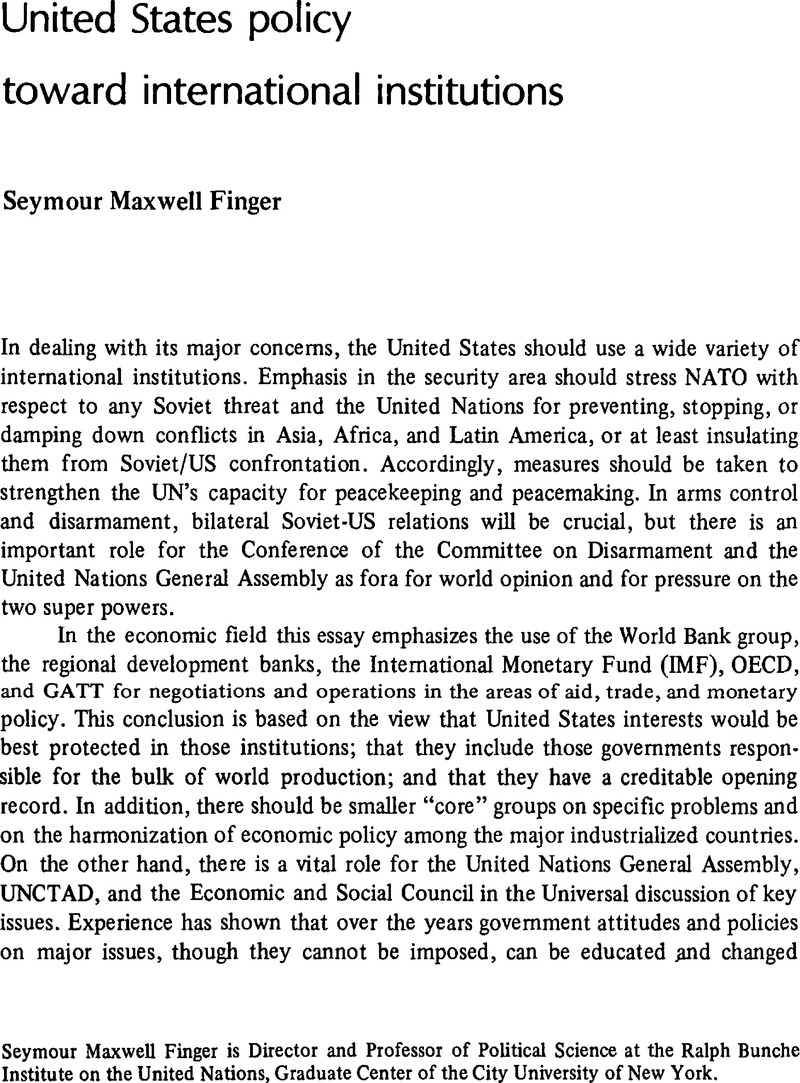Article contents
United States policy toward international institutions
Published online by Cambridge University Press: 22 May 2009
Abstract

- Type
- Symposium: New Directions for International Institutions
- Information
- Copyright
- Copyright © The IO Foundation 1976
References
1 For a fuller discussion of NATO and other alliances, see Hass, Ernst B., Tangle of Hopes (Englewood Cliffs, New Jersey: Prentice-Hall, 1969)Google Scholar.
2 Bloomfield, Lincoln P. and Leisse, Amelia C., Controlling Small Wars: A Strategy for the 1970's (New York: Knopf, 1969), Chapter 12Google Scholar.
3 Finger, S. M., “Breaking the Deadlock on United Nations Peacekeeping”, Orbis, 17:2 (Summer 1973): 385Google Scholar.
4 See Yeselson, Abraham, Testimony before US Senate Foreign Relations Committee, Congressional Record (May 15, 1975), S 8370Google Scholar;Yeselson, Abraham and Gaglione, Anthony, A Dangerous Place: The United Nations as a Weapon in International Politics (New York: Grossman, 1974)Google Scholar; and also Barber, Hollis W., “The United States vs. the United Nations”, International Organization, (Spring 1973): 139–64Google Scholar.
6 Cooper, Richard N., “Prolegomena to the Choice of a Monetary System”, International Organization, 29:1 (Winter 1975): 94Google Scholar. See also the Report of the Trilateral Commission Monetary Task Force, “Towards a Renovated World Monetary System”, The Triangle Papers, No. 1 (New York, 1973)Google Scholar. As Cooper notes, informal monetary arrangements are often superior to formal ones since they allow greater weight to the real powers. The meeting of the heads of government of France, the Federal Republic of Germany, Italy, Japan, the United Kingdom and the United States in the Fall of 1975, resulting from a French initiative, could lay the groundwork for better coordination of policies-on inflation, recession, monetary policy, exchange rates, energy, raw materials, and relations with the developing countries-among nations which account for about two-thirds of world trade and production.
6 Seynes, Philippe De, “Prospects for a Future Whole World”, International Organization, 26:1 (Winter 1972): 3Google Scholar.
7 Camps, Miriam, The Management of Interdependence (New York: Council of Foreign Relations, 1974), p. 53Google Scholar.
8 Krause, Laurence B. and Nye, Joseph S., “Reflections on the Economics and Politics of International Economic Organizations”, International Organization, 29:1 (Winter 1975): 323–42Google Scholar.
9 Gardner, Richard N. in New Structures for Economic Interdependence, a report of a conference held in May 1975Google Scholar, under the auspices of the Institute on Man and Science, Rensselaerville, New York. See also comments by Robert Triffin on pgs. 26–9 of the same volume.
10 Gold, Joseph, “Weighted Voting Power: Some Limitations and Some Problems”. American Journal of International Law, 68, No. 4 (October 1974): 687–708Google Scholar.
11 Baldwin, Robert and Kay, David, “International Trade and International Relations”, International Organization, 29:1 (Winter 1975): 99–131Google Scholar.
12 Cox, Robert W. and Jacobsen, Harold R., The Anatomy of Influence: Decision Making in International Organization (New Haven: Yale University, 1973)Google Scholar.
13 Gardner, Richard N., “To Make the World Safe for Interdependence”, UN 30 (New York: United Nations Association of the U. S. A., 1975)Google Scholar: 15. See also Falk, Richard “The UN: Various Systems of Operation” in Gordenker, Leon, ed., The United Nations in International Politics (Princeton; N. J.: Princeton University Press, 1971)Google Scholar, for his stress on the UN role in the formulation of a world public interest with respect to subject matter of a global dimension; e. g., nuclear weapons, oceans, environment, population, food.
14 Krause and Nye, 341.
15 The same phenomenon is recorded by Harlan Cleveland, not only with respect to economic issues but also anticolonial doctrine and some aspects of international law, “The Pace of Mutation”, UN 30: 13.
16 See Finger, S. M., “The Third World Countries and the Arab-Israeli Question at the UN”, Middle East Review (Spring/Summer 1975): 27Google Scholar, and “A New Approach to Colonial Problems at the United Nations”, International Organization, 26:1 (Winter 1972): 147–48Google Scholar. See also Lall, Arthur, “Some Thoughts on the UN General Assembly as a Forum for Mediation and Negotiation”, Journal of International Affairs, 29:2 (Spring 1975): 63–69Google Scholar.
17 United Nations Document E/AC. 6219/29, May 29, 1975.
18 United Nations Document A/Res/3362 (S-VII), September 16, 1975.
19 Statement by Ambassador Jacob Myerson, US Representative in the Ad Hoc Committee of the Seventh Special Session of the UN General Assembly, September 16, 1975.
20 For supporting arguments see Frank, Charles and Baird, Mary, “Foreign Aid: Its Speckled Past and Future Prospects”, International Organization, 29:1 (Winter 1975): 133Google Scholar.
21 For an example of pitfalls to be avoided see Finger, S. M. and Mugno, John, “The Politics of Staffing the United Nations Secretariat,”, Orbis, 19:1 (Spring 1975): 117–45Google Scholar.
22 Kissinger proposes to expand the role and the capital of the International Finance Corporation, further attesting to the central role the US envisages for the Bank group. He did not specify, however, the locus of three other institutions he proposed: an International Investment Trust, an International Center for the Exchange of Technological Information, and an International Industrialization Institute.
23 Reichley, A. James, “A Foreign Policy for the Era of Inter-Dependence”, Fortune (April 1975): 153–60. Also, an OECD Working Party has recently agreed on a draft code of conduct for transnational corporations which should be of some value, and at a minimum, should provide an interesting item for the agenda of the UN Commission. (New York Times, October 27, 1975), p. 41Google Scholar.
24 New York Times (October 17, 1975), p. 6.
15 Bloomfield, Lincoln P., In Search of American Foreign Policy (New York: Oxford University Press, 1974), p. 165Google Scholar.
- 3
- Cited by




